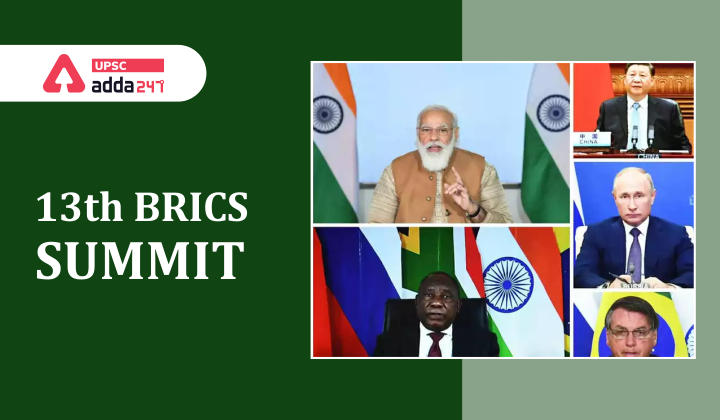Table of Contents
13th BRICS Summit- Relevance for UPSC Exam
- GS Paper 2: International Relations- Bilateral, regional and global groupings and agreements involving India and/or affecting India’s interests.
13th BRICS Summit- Context
- Recently, the 13th BRICS summit 2021 was held virtually under the chairmanship of India. Prime Minister of India chaired the 13th BRICS summit 2021 virtual meeting.
- The 13th BRICS summit 2021 was dominated by the developments in Afghanistan and adopted the BRICS Counter-Terrorism Action Plan.
- The ‘New Delhi Declaration, was adopted by the BRICS Leaders which is an outcome document of the 13th BRICS summit.
13th BRICS Summit -Key Points
- It will be the third time that India will be hosting the BRICS Summit after 2012 and 2016.
- The theme of the 13th BRICS Summit: ‘BRICS@15: Intra-BRICS cooperation for continuity, consolidation, and consensus.’
- Chairmanship: India is chairing the 13th BRICS Summit 2021, which also coincides with the fifteenth anniversary of BRICS, as reflected in the theme for the Summit.
- Priority Areas highlighted by India: India had outlined four priority areas for its Chairmanship. These are Reform of the-
-
- Multilateral System.
- Counter-Terrorism.
- Using Digital and Technological Tools for achieving SDGs.
- Enhancing People to People exchanges.
Taliban Rule in Afghanistan and Its Implications for India
13th BRICS Summit- Key Outcomes
- On Afghanistan Issue:
- The BRICS leaders called for fostering an inclusive intra-Afghan dialogue so as to ensure stability, civil peace, law, and order in the country.
- Highlighted the priority of fighting terrorism, including preventing attempts by terrorist organizations to use Afghan territory as a terrorist sanctuary and to carry out attacks against other countries.
- Called for addressing the humanitarian situation in Afghanistan and urged the need to uphold the rights of women, children, and minorities.
- BRICS countries were divided on the issue of engagement with the Taliban with Russia and China adopting a proactive policy on the issue.
- The summit emphasized the importance of the principle of “non-interference” in international affairs and said disputes and conflicts should be resolved by peaceful means.
- Adoption of BRICS Counter-Terrorism Action Plan: New Delhi Declaration also adopted the BRICS Counter-Terrorism Action Plan during the summit.
- Key Objectives of BRICS Counter-Terrorism Action Plan: To ensure cooperation between BRICS countries in areas such as-
- Preventing and combating terrorism,
- Radicalization,
- Financing of terrorism,
- Misuse of the internet by terrorists,
- Curbing travel of terrorists, b
- Border control,
- Protection of soft targets,
- Information sharing, capacity building,
- International and regional cooperation.
- On Countering COVID-19: The 13th BRICS Summit also discussed the COVID-19 pandemic and the strategy to strengthen counter-pandemic cooperation and multilateral reform.
- The New Delhi Declaration called against playing politics with the pandemic and the COVID-19 virus and urged for a global effort to eradicate the virus.
- Cooperation in Space Sector: The summit resulted in an agreement on a Remote Sensing Satellite Constellation between the member country space agencies which will deepen the cooperation in the space sector.
- On conflicts in other countries: The BRICS leaders also took up the conflicts in Myanmar, Syria, the tension in the Korean peninsula, Israel-Palestine violence, and other territorial disputes.
- On Reforming United Nations: The summit called for reform of the UN Security Council and urged to “revitalize” the UN General Assembly.
Read More About BRICS-Here



 TSPSC Group 1 Question Paper 2024, Downl...
TSPSC Group 1 Question Paper 2024, Downl...
 TSPSC Group 1 Answer key 2024 Out, Downl...
TSPSC Group 1 Answer key 2024 Out, Downl...
 UPSC Prelims 2024 Question Paper, Downlo...
UPSC Prelims 2024 Question Paper, Downlo...




